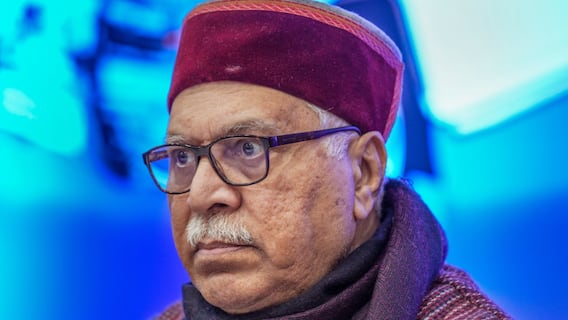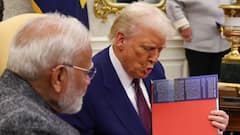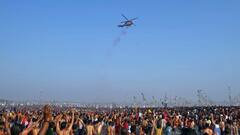Explorer
Second Meghalaya BJP leader resigns over cattle slaughter ban

Bachu Marak's resignation comes four days after West Garo Hills district president Bernard Marak made an exit from the party on the same issue. PTI
NEW DELHI: The Bharatiya Janata Party (BJP) in Meghalaya suffered yet another major political setback with its district BJP president of North Garo Hills, Bachu Marak, resigning from the party over the Centre's ban on the sale of cattle in markets for slaughter.
Bachu Marak's resignation comes four days after West Garo Hills district president Bernard Marak made an exit from the party on the same issue.
He alleged that BJP leaders were "attempting to impose its non-secular ideology on the indigenous people in Meghalaya".
Bachu Marak's resignation came after Bernard Marak's, who as the district president of the BJP in West Garo Hills, had accused that the leaders of the party were "not respecting the tradition and culture of the indigenous people".
"As a responsible leader, I cannot mislead the people and allow them (BJP) to impose the non-secular ideology on us. They cannot impose the beef ban in our state," Bachu told IANS over phone.
"Beef is one of our traditional diet and no government can restrict people's food habit. The moment they impose such restriction the ruling party would surely lose people's confidence," he said.
"I cannot compromise on the sentiments of the Garos. As a Garo, it is my responsibility to protect the interest of my community. Beef eating is part of our culture and tradition. Imposition of BJP's non-secular ideology on us is not acceptable," Bachu said after resigning from the party last
night.
State BJP President Shibun Lyngdoh, however, dismissed Marak's claim.
"He (Bachu Marak) is making such statement to mislead the people. The party has no intention to impose any anti-constitutional measures to the people. The objective of (Prime Minister Narendra) Modi government is to ensure all round development across India," Lyngdoh told IANS.
Last week, some BJP leaders in the state had threatened to quit the party if the central government refused to repeal the new cattle trade and slaughter rules.
"Most party leaders in Meghalaya are not happy with the new rules which are directly affecting the socio-economic status of the people," BJP Vice President John Antonius Lyngdoh said.
"We cannot accept the new rules on cattle trade and slaughter. We cannot go against our food behaviour besides putting the economic interest of those people dealing in cattle trade and slaughter in jeopardy," he said.
More about centre's ban on the sale of cattle in markets for slaughter
The central ban on the sale of bulls, bullocks, cows, buffalos, steers, heifers, calves and camels in animal markets for slaughter has been imposed through a notification issued under the Prevention of Cruelty to Animals Rules, 2017.
A notification issued by the Union environment ministry on May 23 prohibits the sale or purchase of cattle in livestock markets for "slaughter purpose" with the word "cattle" covering bulls, bullocks, cows, buffaloes, steers, heifers, calves and camels.
The new rules - known as the Prevention of Cruelty to Animals (Regulations of Livestock Markets) Rules 2017 - require sellers to provide a signed declaration that the cattle "has not been brought to market for sale for slaughter". Buyers of cattle shall "not sell the animal for the purpose of slaughter".
The notification specifies the creation of an animal market committee that should ensure that the declaration has the name and address of the owner of the cattle and a copy of a photo identity proof. Details that identify the cattle should also be mentioned.
The panel should retain every declaration for six months and produce it if an inspector demands it during that period.
The market committee is also required to take an undertaking from the buyer that the animals have been bought for agricultural purposes and not for slaughter. The committee is expected to ensure that the buyer is an agriculturist by asking to see the relevant revenue document.
The buyer must also declare that the animal would not be sold for six months from the date of purchase.
The new rules ban animal markets within 25km of any state border and 50km of any international border.
Veterinary inspectors in animal markets will be expected to provide "emergency euthanasia" to animals that have severe, irreparable injuries or are terminally ill. They must also ensure that carcasses, including those of naturally dead animals, are incinerated and not sold or flayed for leather. This applies only to deaths taking place in the animal markets.
An animal welfare specialist who had helped draft the rules said they were aimed at ensuring that animals for slaughter were sourced directly from farms and that only healthy animals were traded for agricultural purposes, under veterinarians' supervision.
(With inputs from agencies)
Follow Breaking News on ABP Live for more latest stories and trending topics. Watch breaking news and top headlines online on ABP News LIVE TV
View More
Advertisement
Trending News
Advertisement
Advertisement
Top Headlines
Cities
Cities
India
India
Advertisement


Prosenjit NathThe writer is a technocrat, political analyst, and author.
Opinion








































